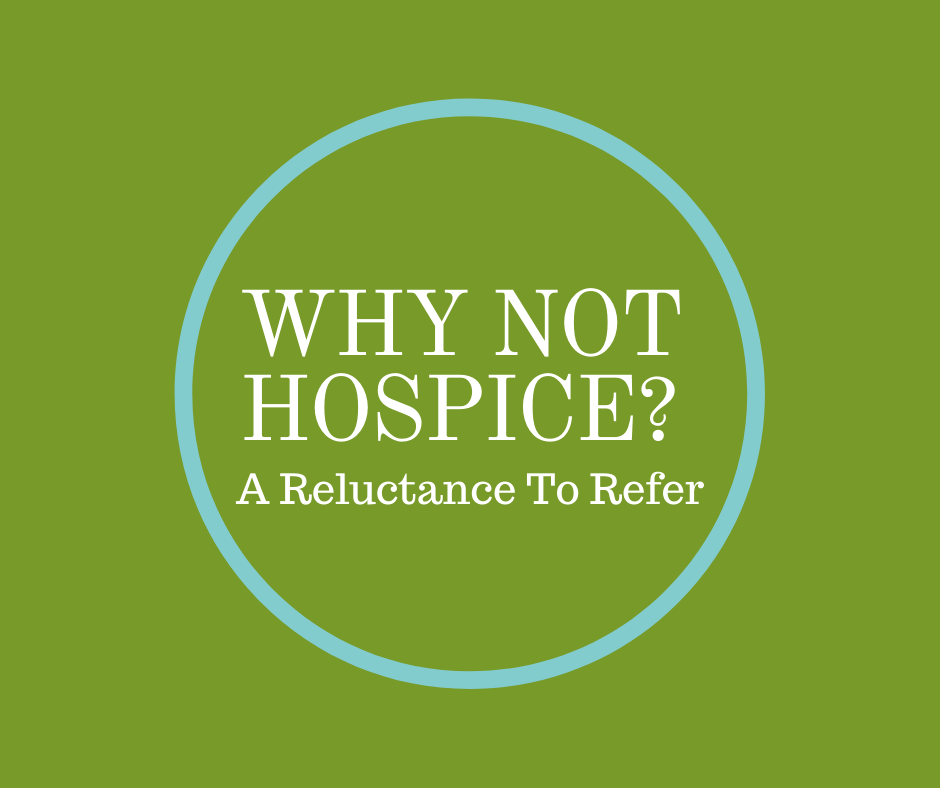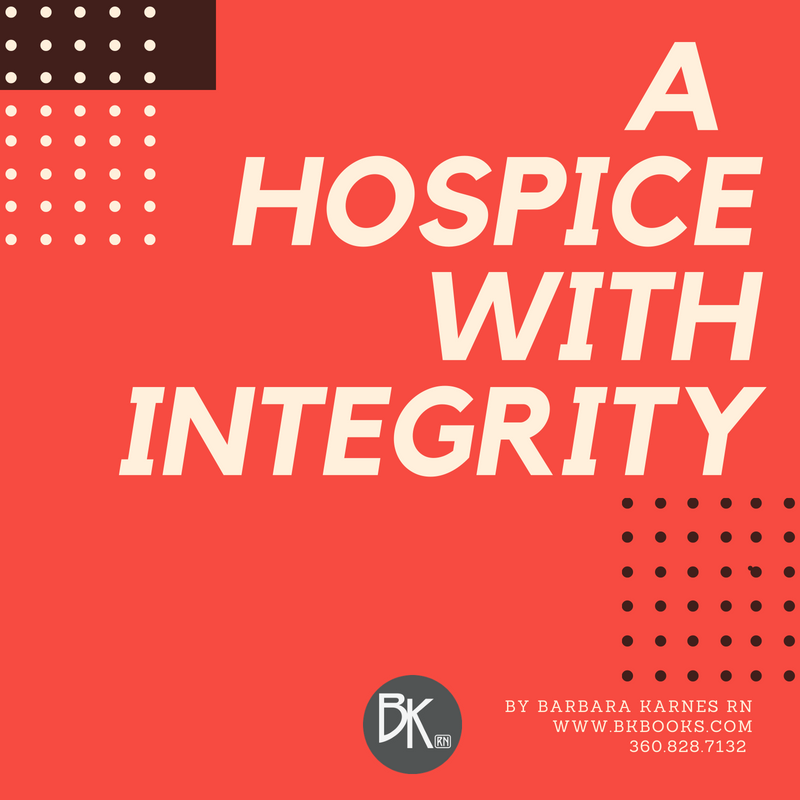Dear Barbara, Will you speak to dying "euthanized" or given fairly heavy duty morphine drips to allow "dying in peace". I've also seen doctors recommend it to "hasten" the painful process of dying. Most people do not believe that death is not painful. I've also seen patients who ask for morphine to hasten the process. That's my question... should a dying person be offered that choice and would it be considered medically legal?
I don’t think offering a patient the choice of receiving a dosage of medication that will end life is legal. Look at all the discussion and controversy about physician-assisted death which is legal in several states but still causes much dissent.
As health caregivers our job is to provide care prescribed by the attending physician --not to make major medical decisions on our own for the patient. We provide care, not prescribe it. It is certainly not within our role to act if a person, in the pain of the moment, wants help in ending their life. In the “pain of the moment” are the operative words here. I cannot tell you the number of times I have heard that plea in the throngs of pain, and the relief when that pain is relieved and life continues.
Now lets talk about the pain of dying. In my experience and observations dying is not painful. DISEASE causes pain. To the observer the labor in the days before death can look painful: the restlessness, the congestion, the aggravated breathing, the facial expressions and the body coloring (mottled, ashen). The body is not functioning in a “normal” manner. The systems are shutting down, as is thinking, interacting, reacting, and responding. When pain is not part of the disease process, and there are lot of diseases that people die from that do not cause pain, it is the people watching that tend to translate what they are watching into pain. Our fear of what we are seeing, sees pain. I do not see it as our place to make the choice to end a person’s life because of our perceptions of suffering.
There are many diseases that cause awful, excruciating pain. It is our job as professionals to see that that pain is controlled. We can’t eliminate the pain but we can cover it up. We even have the ability to create an induced coma when traditional medications fail to bring comfort.
What I have seen is that in the months before death occurs pain is at its highest. Why? Because that is when we are alert and aware and when our fears and emotions tend to escalate the pain. I certainly am not saying the pain isn’t real---it is very real. I am saying that the flame is higher because of our emotions. As death gets closer and we begin disconnecting from this reality the emotions play less of a part in the pain. In the days before death we are generally unresponsive and only our body language and those around us with their perceptions show our pain.
If pain has been a part of the disease process, always give the pain medicine up to the moment of death. Increase the dosage with a physician order if restlessness is intense. Our goal is always comfort but not death. Often healthcare workers fear that they have “killed” a patient if death comes within minutes after giving the pain medicine. That is probably not the cause of death. If death occurred that soon after the medication was given the circulation which carries the medicine through the blood stream was so diminished a regular dosage would have no effect.
“Should they be offered the choice”? In a way, yes, I think a person should be offered the choice of how they want their life to end. That talk needs to be at the beginning of the disease process. At a time when how a person wants to live their life and how they want their last months, weeks, days and hours to be is not colored by the withdrawal, the disconnect from reality, and the pressure of pain. This is why Advanced Directives are so important. How we want to live until we are dead. “Medicate me as much as possible if pain is part of my disease” is an appropriate addition to an Advanced Directive.
As we laying dying, days to hours before our body succumbs to the inevitable, we will be unable to make decisions for ourselves. HOWEVER, I strongly believe that we do not want a practice developed that puts the decision to end our life in the hands of others---no matter how much we plead at the time.
Something More... about Pain, Morphine & "Dying in Peace"
In my educational film, This Is How People Die, I go into great detail about death with disease/pain and how to manage with narcotics. I also talk about setting up advanced directives. It is a comprehensive workshop on all facets of end of life and is a must-watch for hospice volunteers, new hospice nurses, and gerontology students, among others.








2 comments
Sue
As a Palliative Care NP, I refer a lot of patients to hospice. I also have patients and families who refuse hospice or are actively dying before hospice can be started and I manage their pain and anxiety before the end of life. I have a different perspective than yours. We have a regular comfort order set that includes morphine. My goal is to make the patient as comfortable as possible so that their spirit can let go of their physical body. I try to look at the whole patient. I had a patient about a month ago. She was essentially non responsive. Her heart rate was 130, her body was sweating profusely. These are signs to me that the patient is uncomfortable. With a little morphine she relaxed, heart rate slowed and the sweating significantly improved. A few hours later (when the morphine would be wearing off), her heart started racing and she started sweating again so she was given morphine again. We also took a holistic approach and had warm blankets and a harp player in the room. This patient had a beautiful and peaceful death that we would all dream about.
While death is part of life, if I can make a patient more comfortable and less anxious, as well as help the family not see their loved one scared or writhing in perceived pain (whether to patient or the family), I feel it is my honor and obligation to do this. I can guarantee we don’t give dosages high enough to euthanize patients but we do try to make the death comfortable and a not a scary process to go through for the patient, family as well as the medical staff.
As a Palliative Care NP, I refer a lot of patients to hospice. I also have patients and families who refuse hospice or are actively dying before hospice can be started and I manage their pain and anxiety before the end of life. I have a different perspective than yours. We have a regular comfort order set that includes morphine. My goal is to make the patient as comfortable as possible so that their spirit can let go of their physical body. I try to look at the whole patient. I had a patient about a month ago. She was essentially non responsive. Her heart rate was 130, her body was sweating profusely. These are signs to me that the patient is uncomfortable. With a little morphine she relaxed, heart rate slowed and the sweating significantly improved. A few hours later (when the morphine would be wearing off), her heart started racing and she started sweating again so she was given morphine again. We also took a holistic approach and had warm blankets and a harp player in the room. This patient had a beautiful and peaceful death that we would all dream about.
While death is part of life, if I can make a patient more comfortable and less anxious, as well as help the family not see their loved one scared or writhing in perceived pain (whether to patient or the family), I feel it is my honor and obligation to do this. I can guarantee we don’t give dosages high enough to euthanize patients but we do try to make the death comfortable and a not a scary process to go through for the patient, family as well as the medical staff.
T H Eaton
I do not disagree with your point of view and I would like to share mine. Long before being intimately involved with death by old age and or long term debilitating disease in three near and dear family members, I came to believe that “self determined death with dignity” would be my dearest last wish. Hospice care clearly has a place in that scenario because no matter how I choose to die my family will need trained, compassionate, care givers to help them and me to the final day. If Hospice backs away from Death with Dignity patients it will be a huge loss for both groups. Please take the time to check out deathwithdignity.com and read the conditions required by the New laws.
I do not disagree with your point of view and I would like to share mine. Long before being intimately involved with death by old age and or long term debilitating disease in three near and dear family members, I came to believe that “self determined death with dignity” would be my dearest last wish. Hospice care clearly has a place in that scenario because no matter how I choose to die my family will need trained, compassionate, care givers to help them and me to the final day. If Hospice backs away from Death with Dignity patients it will be a huge loss for both groups. Please take the time to check out deathwithdignity.com and read the conditions required by the New laws.